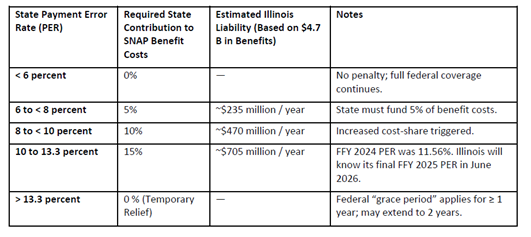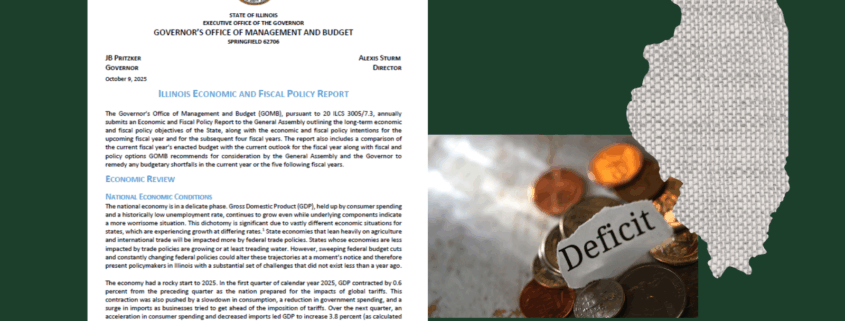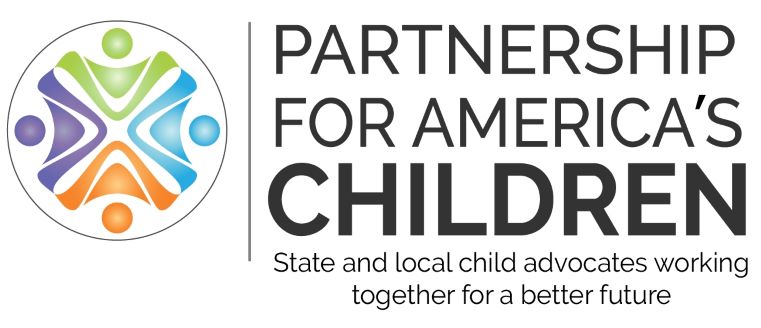Illinois’ Fiscal Future: Projected Deficits
The Illinois Governor’s Office of Management and Budget (GOMB) has looked at current economic projections, state revenue trends, and the impact of the major federal tax and spending bill enacted this summer and reached the following conclusion: Under current state statutes and spending trends, the state of Illinois is facing a fiscal deficit of $267 million for the current fiscal year and approximately $2.2 billion for the next fiscal year (which begins July 1, 2026). The deficit trend continues upwards in succeeding fiscal to a projected deficit of nearly $5.3 billion by fiscal year 2031.

#3 references decoupling, which is explained below.
Last year’s GOMB report also projected a deficit, which the legislature eventually closed by cuts to health care for undocumented residents ages 42-64, other spending cuts, and a set of revenue measures totaling more than $800 million. (See CAFC’s blog post on the approved state budget.) However, recent federal activity has created deep cuts in projected federal revenue to the state as well as additional uncertainty in the economy. Adding to this uncertainty, as of this writing, is a partial federal government shutdown.
Medicaid
Chief among the changes are federal cuts to Medicaid. In H.R. 1, which some refer to as the One Big Beautiful Bill that was signed into law on July 4th, there are major changes to Medicaid resulting in a 14% reduction in expenditures over 10 years or $911 billion.[1] The non-profit KFF estimates that when broken out by reimbursements to states, it could result in Illinois loosing $46 billion in Medicaid federal funding during the next decade – possibly as much as $57 billion.[2] The largest reductions in the program result from the following:
- Starting January 1, 2027, Medicaid recipients ages 19-64 will need to document at least every six months 80 hours per month of work, community service, or attendance at school. (States that can document they have undertaken a “good-faith effort” to comply with the law could receive an exemption until 2029.) There are exceptions to this requirement that include parents/guardians of children under age 13 or disabled, disabled veterans, foster youth under age 26, and medically frail individuals.
The Illinois Department of Healthcare and Family Services estimates 270,000-500,000 Illinois Medicaid enrollees could lose coverage.[3] (Such individuals could still go to a hospital emergency room, which is still required to treat them, potentially resulting in uncompensated care for the hospital.) Furthermore, effective next October, refugees, parolees, asylees, victims of trafficking, and other groups currently considered qualified to receive Medicaid benefits would no longer qualify for the program. There are exceptions for individuals from certain countries.[4]
- Changes to permitted provider taxes that allow states to tax hospitals and other healthcare providers to secure matching federal Medicaid funds. The maximum allowable rate is now 6%. Under H.R. 1, that maximum rate is reduced for states – including Illinois – that enacted Medicaid expansion. Starting in October of 2028 the rate drops from 6% to 3.5% by October of 2032.[5]
 GOMB estimates that using general revenue funds to make up for the overall lost revenue would require $304 million in Fiscal Year 2028 and nearly $1.7 billion in Fiscal Year 2031.
GOMB estimates that using general revenue funds to make up for the overall lost revenue would require $304 million in Fiscal Year 2028 and nearly $1.7 billion in Fiscal Year 2031. - Caps on state directed payments, which allow states to direct Medicaid managed care organizations to make payments to providers. H.R. 1 requires states to reduce such payments starting in 2028 by 10% per year until they are no greater than 100% of Medicare payment levels.
Over three-quarters of the Medicaid reductions occur between 2030 and 2034, meaning the entire impact is not reflected in GOMB’s projections. As noted above, hospitals would still be required to provide emergency room care. If not compensated, along with the other Medicaid changes, it could place rural and urban healthcare facilities with a heavy Medicaid-patient caseloads at risk of closing or discontinuing certain services.
Tax Law Changes
Calculating payments under Illinois’ individual and corporate income tax rates generally begins with the taxpayer’s federally determined income level. Thus, unless Illinois reverses (or “decouples” from) these tax provisions, they impact the total revenue collected by the state.
H.R. 1 provides corporate tax changes that could reduce state revenue collections by more than $830 million in the current fiscal year unless reversed. Chief among these are corporate provisions allowing for:
- A new temporary 100% tax write-off for the cost of manufacturing structures.
- Immediate full expensing for domestic research and development costs (versus amortizing the costs over five years as outlined by a 2022 tax bill).
(H.R. 1 also continued a 2017 tax provision allowing for immediate and full expensing of qualified investments in machinery and equipment.)
As of this writing, Illinois legislative leadership has discussed the possibility of decoupling from federal tax code provisions but has not yet enacted any legislation.
Supplemental Nutrition Assistance Program
Two major changes in the Supplemental Nutrition Assistance Program (SNAP) would shift costs to the state. States now pay half of the administrative cost of the SNAP. That changes under H.R. 1 to 75% of costs in October 1, 2026. The state estimates the measure will cost Illinois $80 million annually. (SNAP currently covers approximately 1.9 million residents with an average household benefit of $370 per month.)

Currently, the federal government pays 100% of SNAP benefits. H.R. 1 establishes a new cost sharing model in October of 2027 for states with a payment error above 6%. Essentially, an error payment could be an overpayment or underpayment of benefits set when calculating an individual’s eligibility for the program. The 2024 Illinois error payment rate was 11.56%. Based on the established schedule, unless Illinois reduces its payment error rate, it would need to pick up 15% of the overall benefit costs. That could cost the state more than $700 million annually.

Source: Governor’s Office of Management and Budget
H.R. 1 also imposes a new work requirement for SNAP recipients. Under federal law prior to H.R. 1, there was a work requirement for abled-bodied adults ages 18-54. There were exemptions for parents/guardians with children under age 18, veterans, people experiencing homelessness and young adults aging out of foster care. For a number of years, Illinois had a federal waiver from the work requirement. However, that waiver ends next month (November 1, 2025).
Furthermore, H.R. 1 increases the work requirement for abled-bodied adults to individuals ages 18-64. (Also, similar to Medicaid, it requires 80 hours per month.) An exemption will apply to parents/guardians of children under the age of 14. However, the program will no longer exempt veterans, homeless individuals, and young adults transitioning out of foster care from the work requirement. Anyone who loses eligibility is limited to three months of assistance.
However, there is a more immediate issue that could impact the current fiscal year’s picture. Because of the federal government shutdown, SNAP benefits could run out at the end of October. In a press release issued by the Illinois Department of Human Services on October 16th, the department stated: If SNAP funds are not delivered by the federal government, the State of Illinois does not have the budgetary ability to backfill these critical resources.
Such a measure could strain food banks across the state.
“We are seriously worried about if this shutdown continues to go on, the longer it goes, the more people and the more hardship and hunger this is going to create in our communities”
Man-Yee Lee, spokesperson for the Greater Chicago Food Depository[6]
All of this occurs at a time when food prices continue to remain high from pre-pandemic levels. As noted in our 2025 Data Book on the Well-Being of Illinois Children, between January of 2020 and April of 2025, prices for food consumed at home increased by 28.3%. That does not take into account the full impact of tariff’s imposed by the Trump Administration during 2025.
The projected state budget deficit for the current state fiscal year does take into account potential savings resulting from an executive order issued by Governor J.B. Pritzker in September that directs state agencies to identify immediate spending reductions with the goal of reaching a reserve of 4% of general funds appropriations for the current fiscal year.
However, the GOMB analysis does not account for any programmatic cuts that may occur in federal funding for housing, energy assistance, mental health programs, and a host of other services as the federal government not only winds its way through the shutdown but crafts a budget for federal Fiscal Year 2026. Whether it is with regards to the current fiscal year or future years, the GOMB review states: GOMB expects the State to have a very limited ability to replace lost federal funding for these specialized state grants and no funding to replace lost grants made directly to local governments and community organizations.
As noted in our data book, Illinois children have a number of economic, health, housing, and educational needs. Left unaddressed, they can impact children well into adulthood with the expense of addressing those impacts compounded. Federal activity requires the state to seriously consider raising new revenue for its current and future needs. Children’s Advocates for Change is currently advocating for the necessary revenue and will continue to do so as the Illinois General Assembly enters its 2026 spring session.
Written by Mitch Lifson
[1] https://www.kff.org/medicaid/allocating-cbos-estimates-of-federal-medicaid-spending-reductions-across-the-states-enacted-reconciliation-package/
[2] Ibid
[3] https://www.dhs.state.il.us/OneNetLibrary/27897/documents/SNAP/HHS%20Trump%20Budget%20Bill%20Briefing%20Deck_08012025_A11Y%20(1).pdf
[4] This includes Cuban and Haitian entrants, and citizens from the Marshall Islands, Micronesia, and Palau.
[5] https://medicaiddirectors.org/resource/how-medicaid-provider-taxes-work-an-explainer/
[6] https://chicago.suntimes.com/health/2025/10/17/snap-benefits-government-shutdown-trump-illinois



